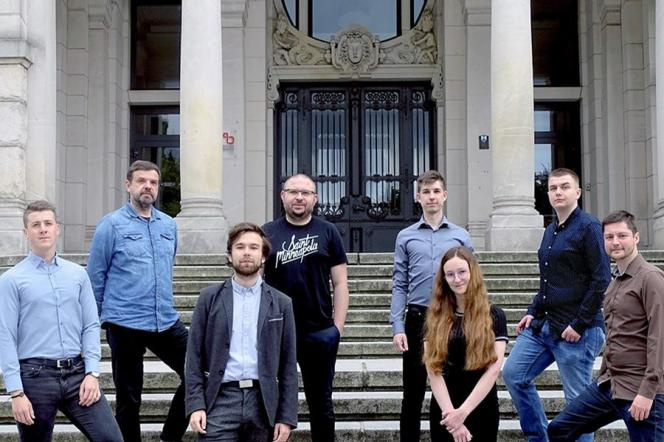Date added: 2020-10-12
More effective fight against kidney tumors thanks to GUT scientists and students

Most of the patients who develop kidney tumors are the elderly, for whom surgery to remove the tumor may be highly risky. According to doctors, if the tumor is not malignant, it is safer not to undergo surgery and leave the tumor only for further observation.
However, determining the malignancy of a tumor is not a simple task. It is estimated that currently in Poland 15 to 20 percent of kidney removal surgery after tumor detection is performed unnecessarily, because the tumor, initially defined as malignant, turns out to be benign after surgery and histopathological examination.
Annually in Poland about 900 operations are performed, which unnecessarily endanger the health of patients and significantly worsen their quality of life, and this problem will only increase in the future. The SARS-CoV-2 virus, which causes kidney disease in up to 15 percent of the infected patients, may also contribute to this..
A system developed by scientists, doctors and students
GUT scientists and students help to solve this problem. They developed the TITAN (Technology In Tumor ANalysis) system, which uses machine learning technology and artificial intelligence algorithms to determine the probability of a kidney tumor malignancy based on a CT scan of the abdominal cavity.
The Radiato.ai team, which is responsible for the TITAN project, managed to combine the competences and possibilities of research and teaching staff of the GUT Faculty of AP&M: PhD, Eng. Patryk Jasik (Team Leader) and PhD, Eng. Paweł Syty (Product Owner), as well as students of the Faculty of AP&M and ETI: Aleksander Obuchowski (Head AI Architect), Roman Karski (Data Scientist), Barbara Klaudel (Medical Image Specialist), Bartosz Rydziński (Backend Developer) and Mateusz Anikiej (Devops) . The team also included doctor Mateusz Glembin from the Urology Department of Św. Wojciech hospital in Gdańsk.
Artificial intelligence helpful in assessing the malignancy of tumors
The TITAN IT system uses artificial intelligence to assess the malignancy of kidney tumors based on computed tomography (CT) images, with an efficiency of 87%. For the purpose of creating an original predictive model based on machine learning methods, over 15 000 computed tomography images were obtained from nearly 400 medical cases.
–When developing our algorithm, we paid special attention to the diagnosis of benign tumors, because it is their correct detection that could potentially save the patient's life - explains Aleksander Obuchowski, the chief AI architect of the project. - It was not an easy task, as benign tumors accounted for only 26 percent of our database. After analyzing dozens of neural network architectures and image processing methods, we managed, however, to achieve a score of 10/10 for correctly identified benign tumors.
This, in turn, allowed for the construction of a knowledge base on which algorithms using deep neural networks were trained, achieving such a high efficiency while capturing 10 out of 10 benign tumors. As a result, this may translate into saving the unnecessarily removed kidneys and reducing the number of unnecessary operations.
–Thanks to the use of the TITAN system, the doctor obtains an additional opinion in the form of an algorithm suggestion in just a dozen or so seconds - explains PhD, Eng. Patryk Jasik. - The system does not, however, replace a medical diagnosis, but only draws attention to the cases which may have been misclassified. Thanks to the system, doctors are able to take a closer look at such tumors, consult the diagnosis with other specialists, or refer the patient for further tests. As a result, such selection can significantly reduce the number of misdiagnosed tumors.
Additionally, if the histopathological examination reveals that the tumor was indeed a malignant one, the doctor may add such a case to the knowledge base, which will improve the algorithm's operation in the future.
First tests in a hospital in Gdańsk
The system was created as part of the e-Pionier program run by Excento, a special purpose vehicle of Gdańsk University of Technology, which connects teams of young programmers with public institutions in the preparation of innovative solutions in the ICT industry. The problem of the lack of diagnostic tools using information technologies was reported on behalf of Copernicus Podmiot Leczniczy Sp. z o. o. and the hospital of Św. Wojciech in Gdańsk by MD Wojciech Narożański.
The project fits in with its subject matter in two priority research areas of GUT - BioTechMed Center, dealing with research and implementation of modern technologies in the field of biomedical engineering and the Digital Technologies Center, which focuses, among others, on improving the broadly understood safety and comfort of life of the society.
The system will be tested in the near future at the Św. Wojciech hospital in Gdańsk, where doctors will use it in the diagnosis of current cases of kidney tumors. It is the first system of this type in Poland that will be used in practice.

